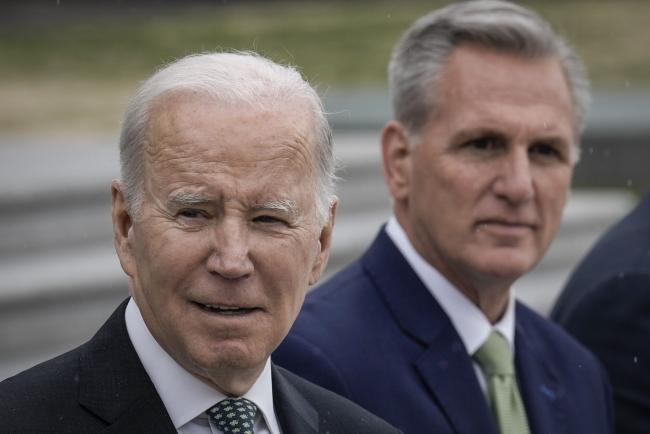(Bloomberg) -- President Joe Biden accused Republicans of trying to “squeeze out more of America’s middle class,” painting the debt ceiling and spending cut proposal unveiled Wednesday by House Speaker Kevin McCarthy as lacking detail and benefiting the wealthy.
Biden’s remarks - from a union training facility in Maryland - were intended as an explicit contrast to McCarthy’s appearance Monday at the New York Stock Exchange, where he told traders the GOP hoped to pass a plan that would raise the debt ceiling for a year while significantly cutting federal spending. The speaker unveiled the legislation on the House floor Wednesday as Biden spoke.
Biden and Democratic leadership on Capitol Hill said following a phone call Tuesday that they are willing to discuss cuts only in the context of the federal budget process, arguing Republicans are using the threat of default to pursue tax cuts for the wealthy and benefits to pharmaceutical and energy companies.
“It’s not about fiscal discipline. It’s about cutting benefits for folks they don’t seem to care much about. It’s about finding ways to squeeze out more of America’s middle class,” Biden said.
He called on McCarthy to “offer a plan, not speeches.”
McCarthy’s proposal would raise the federal borrowing cap by $1.5 trillion, enough to stave off a US payments default until at the latest March 31, 2024, with a vote planned for next week. The measure contains a host of conservative proposals that are non-starters with congressional Democrats and the White House. It would bring discretionary spending back to 2022 levels — a $130 billion cut.
Read more: Speaker McCarthy Proposes $1.5 Trillion US Debt-Limit Increase
McCarthy said in a tweet ahead of Biden’s remarks that the president has “ignored the impending debt ceiling crisis.”
“Instead of leaving town today to give a speech, Biden should sit down with me, find agreement, and avoid the prospect of his administration bumbling into the first default in our nation’s history,” he added.
The posturing by both sides come as Congress returns from its Easter recess, and the administration is expected in the coming weeks to provide a fresh update — following the nation’s income-tax filing deadline on Tuesday — on how long the Treasury Department can continue using so-called extraordinary measures to avoid default.
For McCarthy, the negotiations are the first real test of his narrow and fractious majority, which Republicans argue has a mandate to rein in aggressive post-pandemic spending by Democrats during Biden’s first two years in office. Republicans have accused the White House of being absent and unwilling to negotiate.
Read more: House GOP Plans to Vote Next Week on Debt Ceiling, Spending Cuts
But securing the 218 votes will be difficult for McCarthy, given his slim four-vote majority and that some hardliners in his party have never voted for a debt ceiling increase and are demanding substantial cuts that could alienate moderates.
“I wish my former House colleagues — I wish them well as they work on this,” Senator Marsha Blackburn, a Tennessee Republican who served for 16 years in the House, told Bloomberg Radio on Wednesday. Blackburn predicted that whatever the House passes “will come with a spending plan.”
Biden has repeatedly pressed McCarthy to produce a budget proposal, accusing Republicans of seeking to hide the unpopular consequences of their austerity push and of risking the first-ever US debt default that he said Wednesday “would destroy the economy.”
“And who do you think it would hurt the most? You. Hard-working people,” Biden said, urging McCarthy to “take default off the table and let’s have a real serious detailed conversation”
“America’s not a deadbeat nation,” he added. “We meet our obligations.”
Democrats have also argued that it is unwise to allow any negotiation over the debt ceiling, because doing so offers Republicans a regular opportunity to press their demands. Top officials from the Federal Reserve and Treasury have said a default could prove catastrophic to the US economy, pushing up borrowing costs on credit cards, mortgages, and auto loans while battering markets.
In a memo sent to Capitol Hill on Tuesday, the White House highlighted statements from economists, business groups, and former Republican presidents — including Donald Trump - calling for a clean debt ceiling increase.

